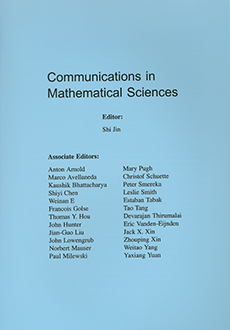Abstract
This paper is meant as an introduction to some of the most classical models in the theory of fragmentation-coagulation. The main models presented are the Becker-Döring, fragmentation-coagulation (discrete or continuous) and Lifshitz-Slyozov ones. Rather than focusing on mathematical technicalities, we have chosen to insist on the physical ideas behind their derivation, in order to present them in a unified framework. The unifying physical principle in this context is the mass action principle, which we expose in detail, our philosophy being that these models may be thought of as technical variations on this theme. We then present some qualitative properties of the models, which include saturation, criticality, and dissipation. The second part of the paper collects some mathematical tools which are of recurrent use in this context, namely the use of moments, of the Laplace transform, and of Lyapunov functions.
Citation
Jean-François Collet . "Some Modelling Issues in the Theory of Fragmentation-Coagulation Systems." Commun. Math. Sci. 2 (S1) 35 - 54, May, 2004.
Information





